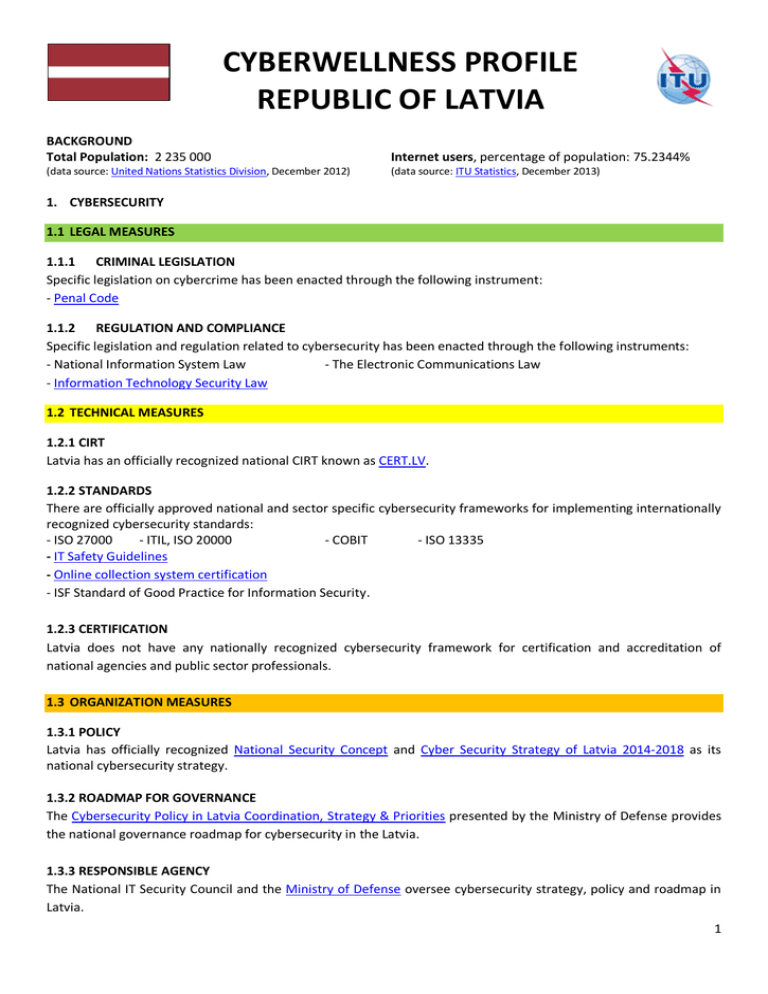CYBERWELLNESS PROFILE REPUBLIC OF LATVIA
advertisement

CYBERWELLNESS PROFILE REPUBLIC OF LATVIA BACKGROUND Total Population: 2 235 000 Internet users, percentage of population: 75.2344% (data source: United Nations Statistics Division, December 2012) (data source: ITU Statistics, December 2013) 1. CYBERSECURITY 1.1 LEGAL MEASURES 1.1.1 CRIMINAL LEGISLATION Specific legislation on cybercrime has been enacted through the following instrument: - Penal Code 1.1.2 REGULATION AND COMPLIANCE Specific legislation and regulation related to cybersecurity has been enacted through the following instruments: - National Information System Law - The Electronic Communications Law - Information Technology Security Law 1.2 TECHNICAL MEASURES 1.2.1 CIRT Latvia has an officially recognized national CIRT known as CERT.LV. 1.2.2 STANDARDS There are officially approved national and sector specific cybersecurity frameworks for implementing internationally recognized cybersecurity standards: - ISO 27000 - ITIL, ISO 20000 - COBIT - ISO 13335 - IT Safety Guidelines - Online collection system certification - ISF Standard of Good Practice for Information Security. 1.2.3 CERTIFICATION Latvia does not have any nationally recognized cybersecurity framework for certification and accreditation of national agencies and public sector professionals. 1.3 ORGANIZATION MEASURES 1.3.1 POLICY Latvia has officially recognized National Security Concept and Cyber Security Strategy of Latvia 2014-2018 as its national cybersecurity strategy. 1.3.2 ROADMAP FOR GOVERNANCE The Cybersecurity Policy in Latvia Coordination, Strategy & Priorities presented by the Ministry of Defense provides the national governance roadmap for cybersecurity in the Latvia. 1.3.3 RESPONSIBLE AGENCY The National IT Security Council and the Ministry of Defense oversee cybersecurity strategy, policy and roadmap in Latvia. 1 1.3.4 NATIONAL BENCHMARKING Currently there are no national or sector-specific benchmarking exercises or referential used to measure cybersecurity development in Latvia. 1.4 CAPACITY BUILDING 1.4.1 STANDARDISATION DEVELOPMENT CERT.LV has developed information technology security recommendations for state and local government authorities; it also has produced some activity reports which suffice as the officially recognized national or sectorspecific research and development (R&D) programs/projecst for cybersecurity standards, best practices and guidelines to be applied in either the private or the public sector. 1.4.2 MANPOWER DEVELOPMENT CERT.LV produces training for IT security issues at the national and local government institutions. 1.4.3 PROFESSIONAL CERTIFICATION There is no available information regarding the exact number of public sector professionals certified under internationally recognized certification programs in cybersecurity. 1.4.4 AGENCY CERTIFICATION CERT.LV is the officially recognized certified government and public sector agency certified under internationally recognized standards in cybersecurity. 1.5 COOPERATION 1.5.1 INTRA-STATE COOPERATION CERT.LV partners with its counterparts around Europe, sharing cybersecurity assets. Latvia is an accredited member state of the TI TF-CSIRT. TF-CSIRT holds regular security incident response team meetings to better get to know colleagues from other countries, as well as to work together in different areas of research and to improve incident resolution options. 1.5.2 INTRA-AGENCY COOPERATION The CERT.LV cooperates with state and local authorities encouraging them to make the security of their electronic information space a priority. CERT.LV has prepared a brief overview of the legal frame of cooperation with state and local authorities. 1.5.3 PUBLIC SECTOR PARTNERSHIP CERT.LV cooperates with the Internet Service providers as a framework for sharing cybersecurity assets between the public and private sector. 1.5.4 INTERNATIONAL COOPERATION CERT.LV is a member of FIRST and TERENA. The government of Latvia has recognized the danger of increased cyber threats and is working together with NATO, the European Union, the Baltic States, Nordic states, and the United States to strengthen its cybersecurity. The United States supports Latvia’s efforts through visits by U.S. experts and Latvian participation in EUCOM and NATO sponsored events and U.S.-based training. The government of Latvia is also a partner in the Freedom Online Coalition, a group of governments collaborating to advance Internet freedom. 2 2. CHILD ONLINE PROTECTION 2.1 NATIONAL LEGISLATION Specific legislation on child online protection has been enacted through the following instrument: - Section 166 of the Criminal Code. 2.2 UN CONVENTION AND PROTOCOL Latvia has acceded, with no declarations or reservations to articles 16, 17(e) and 34(c), to the Convention on the Rights of the Child. Latvia has acceded, with no declarations or reservations to articles 2 and 3, to the Optional Protocol to The Convention on the Rights of the Child on the Sale of Children, Child Prostitution and Child Pornography. 2.3 INSTITUTIONAL SUPPORT The Watchmen website, under the Latvian national police provides information on internet safety for children and youth. 2.4 REPORTING MECHANISM Illegal online content can be reported in the website of the Latvian Safer Internet Centre or by the phone number: 11611. ----------------------------------------------------------------------------------------------------------------------------------------------------------DISCLAIMER: Please refer to http://www.itu.int/en/Pages/copyright.aspx More information is available on ITU website at http://www.itu.int/en/ITU-D/Cybersecurity/Pages/default.aspx Last updated on 20th January 2015 3

